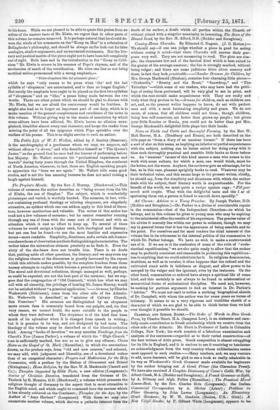The Prophet's Mantle. By the Rev. J. Murray. (Blackwood.)—This volume
of sermons the author describes as " being scenes from the life of Elisha, the eon of Shaphat." The subject, which is wonderfully picturesque and varied, is worthily handed. The sermons, in fact, with- out containing profound theology or-stirring eloquence, are singularly attractive, an epithet which one can seldom apply to this kind of litera- ture, however meritorious and valuable. The writer of this notice has read not a few volumes of sermons ; but he cannot remember running through any one of them with the same sort of interest and with an attention which it cost no effort to keep up. To several of these volumes he would assign a higher rank, both theological and literary ; but not one has he found—to use the most familiar and expressive terms—more readable. Simplicity, directness, and a certain sub-humor- ons shrewdness of observation aretheir di stinguishing characte risti cs. The writer takes the miraculous element precisely as be finds it. Even the story of the she-bears does not trouble him. There is no doubt that, putting aside all other questions, the literary, and we may even say the religious charm of the discourses is greatly increased by the repose which this attitude makes possible, by the complete freedom from those uneasy attempts to explain which become a preacher less than any man. The moral and devotional reflections, though managed as well, perhaps, as could be expected, are not the best part of the sermons ; but we sup- pose that the congregation of "Old Cumnock," which has what we may call with all sincerity, the privilege of hearing Mr. James Murray, would not be satisfied without "a practical application."— Sermons, by Charles Wadsworth (Dickinson), come from the other side of the Atlantic. Mr. Wadsworth is described as " minister of Calvary Church, San Francisco." His sermons are distinguished by an eloquence more ornate than is commonly heard from our pulpits, and, for that very reason, we cannot doubt, the more suitable to the people to whom they were delivered. The eloquence is of the kind that loses much of its splendour when it is changed from speech to writing ; but it is genuine in its way, and not disfigured by bad taste. The theology of the volume may be described as of the liberal-orthodox kind. Among "books of devotion " we may mention Teachings from the Church's Year (James Parker), a volume of which the High-Church " tone is sufficiently marked, but not so as to give any offence ; Choice Notes on the Gospel of St. Mark (Macmillan), in which the annotations drawn, as the preface says, from "old and new sources," and selected, we may add, with judgment and liberality, are of a devotional rather than of an exegetical character ; Prayers and Meditations for the Holy Communion, with a preface by the Bishop of Gloucester and Bristol (Rivingtons) ; Home Religion, by the Rev. W. B. Mackenzie (Cassell and Co.); Thoughts Suggested by Bible Texts, a new edition (Longmans) ; Stories of Christian Devotion, translated from the German of Dr. Tholuck by R. Menzies, D.D. (Blackwood), a volume which presents the religious thought of Germany in the aspect that is most attractive to the English mind, and which ought to command here the success which it has already achieved on the Continent ; Thoughts for the Age, by the Author of "Amy Herbert" (Longmans). With these we may also enumerate another volume, which derives a pathetic interest from the death of its author, a death which all parties within the Church or- without joined with a singular unanimity in lamenting, The State of the Blessed Dead, by the Rev. H. Alford, D.D. (Hodder and Stoughton).


































 Previous page
Previous page